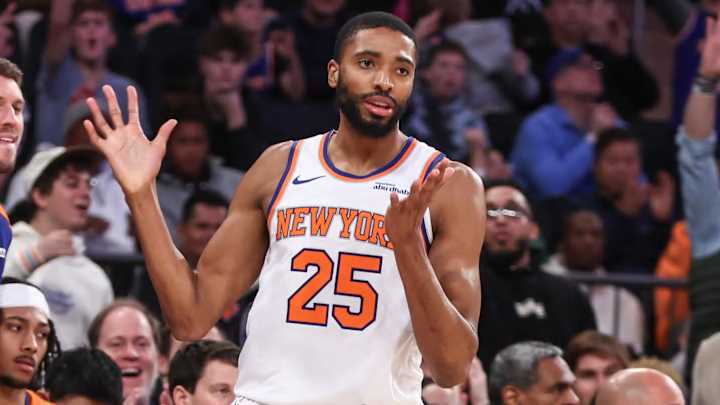Mikal Bridges has been eligible to sign an extension since the end of the NBA Finals, and the continued absence of an agreement is rife with complications. One of them is about the size of Giannis Antetokounmpo. Another rhymes with Schmecond Smapron. And there is only one outcome that sees the New York Knicks successfully juggle everything they’re up against: signing Bridges to a three-year, $86 million deal that includes a player option for the 2028-29 season.
This scenario falls well short of the four-year, $156.2 million max extension for which Bridges is eligible. To that end, there’s no guarantee he signs a three-season pact valued at $86 million. He needs to believe he can’t do much better in unrestricted free agency, and would have to actively prioritize hitting the open market earlier, during the 2028 offseason, when he will be coming up on his age-32 campaign.
The latter detail may actually appeal to Bridges. He should still be good enough in 2028 to command one last three- or four-year windfall. The average annual salary—$28.7 million in the three-year deal vs. $39.1 million in a four-year max—is a different story.
Still, in the event he’s willing to go the three-year route, the Knicks should pounce.
This extension would still allow the Knicks to trade Mikal Bridges
Players who sign extensions that give them more than a 20 percent raise off the salary in the final year of their current deal cannot be traded for six months. If New York offers Bridges the four-season, $156.2 million version and he signs it on or after August 6, it will be unable to move him until after the 2025-26 campaign.
This isn’t a huge obstacle unless the Knicks are open to major midseason changes. They might be. The front office is apparently still lusting after Giannis, and with more stars getting moved ahead of February’s deadline rather than over the offseason, New York has to be ready for anything.
Removing Bridges from the table in potential Giannis talks until next summer is a no-go if the Knicks are serious. They do not have any first-round picks to trade at the moment, and will not be in position to negotiate a package that doesn’t feature Bridges—unless the Milwaukee Bucks are hot for Karl-Anthony Towns.
Penning Bridges to a three-year, $86 million deal takes care of this roadblock. It only requires giving him a 10 percent raise from his $24.9 million salary, nudging it up to $27.4 million for 2026-27. That would keep him trade-eligible from the moment he signs it.
New York needs to start worrying about the second apron
If Bridges signs a max extension or enters unrestricted free agency, his cap hold will take the Knicks right up to or actually into the second apron. Crossing that threshold is inevitable if everybody sticks around. New York should be trying to delay it as long as possible.
A three-year, $86 million extension puts Bridges’ 2026-27 salary at $27.4 million. That’s about $7.5 million less than the $34.9 million he’d get in a max extension. And it is exponentially less than the $49.7 million max salary he could get in unrestricted free agency.
Creating this extra breathing room would leave the Knicks more than $10 million beneath the 2026-27 second apron, as things currently stand. That’s without a new deal for Mitchell Robinson factored in, so he might become collateral damage himself. Or New York could move other money to re-sign him, and skirt the second apron.
The overall point: A three-year, $86 million extension for Bridges is about as close to ideal as it gets for the Knicks—the kind of agreement that doesn’t overpay him, doesn’t undersell his value, accounts for their Giannis aspirations, and increases the odds of them keeping this core together for as long as they believe it’s viable.
